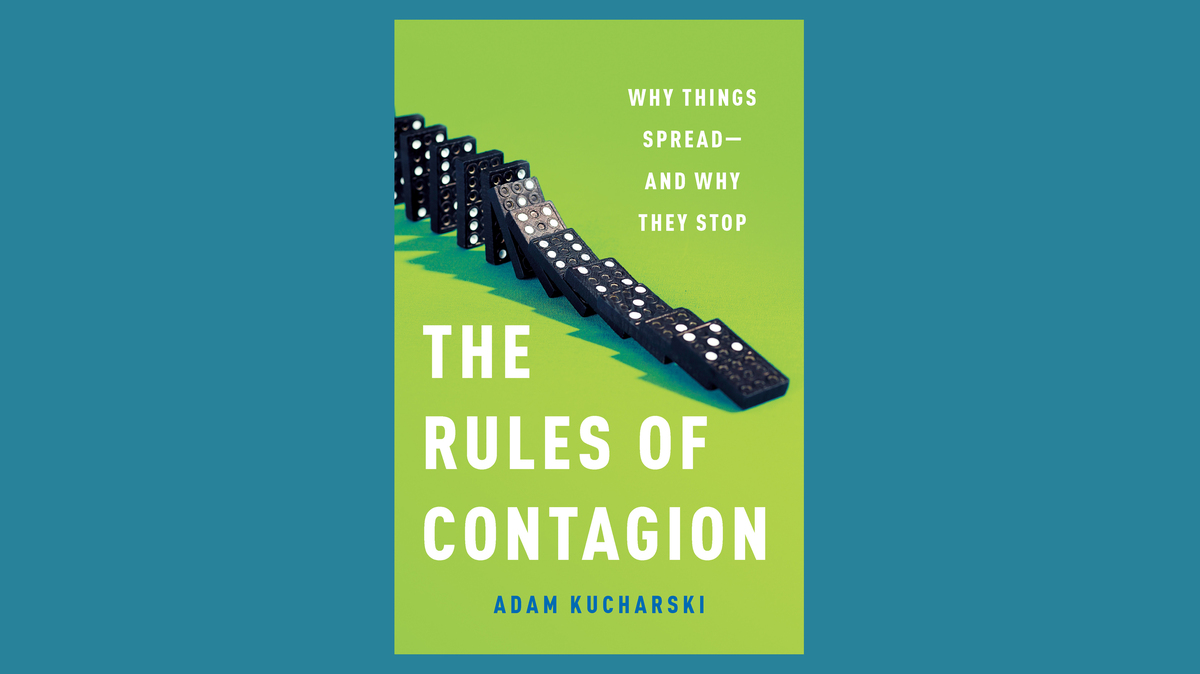


The spread of the coronavirus has surprising similarities to the spread of fake news, gun violence and even social media fads. What they all have in common is that mathematics plays a role in predicting how things “go viral,” whether it’s a germ, a rumor or an internet trend.



Adam Kucharski, associate professor at the London School of Hygiene and Tropical Medicine, is the author of The Rules of Contagion: Why Things Spread — And Why They Stop.
Adam Kucharski
hide caption
toggle caption
Adam Kucharski
In his new book, The Rules of Contagion, Adam Kucharski, associate professor at the London School of Hygiene and Tropical Medicine, talked about how to understand all types of contagion.
In your book, you describe a drinking game, Neknomination, that started on Facebook and YouTube in 2014 in Australia and “went viral.” You studied it when it came to England, and you correctly predicted the game would die out quickly. How did you come to that conclusion?
In Neknomination, people were downing pints of beer and large quantities of alcohol. Each person would do it, post a video online and nominate two or three others to outdo them. Those people had to meet the challenge and nominate others within 24 hours. In studying it, we had two bits of information that are really hard to get at in disease outbreak: the reproduction number — how many others one person “infects” — and the lag time, 24 hours, after which people would stop spreading the game. Friends tend to cluster together and nominate the same people. That reduces the reproduction number below one and leads to a smaller outbreak. Despite a media frenzy in early February 2014, [the game] was all but gone by the end of that month.
Talk about the importance of the reproduction rate in contagion.
It’s the mathematics of exponential spread. For each case of COVID-19 you have, how many others are you infecting? In the early stages of this pandemic, the reproduction number, or “R,” was 2 to 3. Now, in many countries, it’s in the 0.8–1.2 range. Anything above 1 means it’s going to grow. If you bring the “R” rate down below 1, it means one person infects fewer than one other person, and you can say the spread of the disease is under control and will eventually die out. If the “R” is .95, you will have a declining epidemic.
Even though the epidemic is in decline with an “R” of less than 1, some people will continue to get infected, get sick and even die, correct?
Yes, that’s a good point. There could be a large number of individuals still getting sick as transmission slows. You can’t think that when you get to an “R” number below 1, the problem is solved.



How far into the future can you predict how a virus will spread?
The hard thing about predicting the future for COVID-19 is that it’s so dependent on what governments do and what individuals do. You can see a lot of different scenarios depending on what people do. Models can be a useful way of laying out the possibilities. If you lock down longer, this is what will happen; if you lift the lockdown early, then this is what will happen. But a much larger question is what governments and people do with the information. Some countries might think a predicted level of contagion is acceptable. Other countries will think that same level of contagion is too high, and they need to put more measures in place for a longer time.
Contact tracing has been identified as a key element in stopping spread: finding all those in contact with a newly diagnosed case. Can that work in other areas, like stopping the spread of gun violence?
In a pandemic, you identify a patient and then you identify others in that person’s network that they’ve been in contact with. You quarantine them all, and that should stop transmission. Violent events can also spread through definable networks like gangs. If you have a shooting, you try to find other people connected through friends, gangs or other networks. Some communities have what they call violence interrupters — a well-known person in the community who has credibility. They might find friends of a gunshot victim and talk to them about the danger and futility of retaliation.
How do you think this pandemic is going to unfold?
It’s often hard to imagine what might have happened had you done something differently. But we can watch different scenarios. Some countries, like New Zealand, had early travel restrictions and now have local control. With border restrictions, they might be able to keep that going. Other places, like Hong Kong and South Korea, are keeping the pandemic under control but with flare-ups. Some places in Europe and the U.S. are lifting lockdowns, but they’re doing it differently — with or without various substitute measures, like testing, contact tracing, mandatory masks and social distancing. And still other places, like India and South Africa, are not able to keep lockdown measures in place.
With this pandemic, we’ll see alternative realities play out in real time with wide variations around the world. Things aren’t going to look the same for a long time.
Susan Brink is a freelance writer who covers health and medicine. She is the author of The Fourth Trimester and co-author of A Change of Heart.


